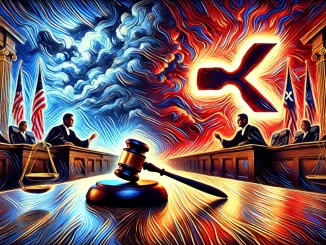
Table of Contents

Introduction
With possible ramifications for other bitcoin companies confronting similar difficulties, Ripple Labs Inc.’s legal fight with the U.S. Securities and Exchange Commission (SEC) marks a major turning point. Ripple recently was ordered by a federal judge to pay a $125 million civil penalty for selling XRP tokens to institutional investors without appropriate registration. A tiny portion of the $2 billion the SEC originally sought, this penalty could indicate good results for other cryptocurrency companies caught in legal conflicts with the government.
The Genesis of the Ripple Effect
December 2020, right in the middle of the COVID-19 epidemic, started the ripple case. The SEC sued Ripple and CEO Bradley Garlinghouse as well as co-founder Christian Larsen for violations of rules. The regulator charged them with producing a “knowledge vacuum” that let Ripple sell over $1 billion worth of XRP while only revealing data about the cryptocurrency under selective disclosure. With many advocacy organizations banding together to support Ripple’s stance, this lawsuit energized the larger crypto community.
The SEC started enforcement actions against several other crypto companies, including Terraform Labs, Binance Holdings Ltd., and Coinbase Inc., since the Ripple lawsuit was filed. Nonetheless, the Ripple case has been considered as a possible landmark since it has the ability to create a precedent on whether cryptocurrencies qualify as securities needing issuer registration and particular investor disclosures.
The Howey Test and Its Use Regarding XRP
The SEC’s case revolved mostly on the claim that XRP is a security under the Howey test, a legal criteria developed by a 1946 Supreme Court decision. According to the Howey test, a security is an investment of money in a shared enterprise with hopes for earnings resulting from the work of others. Ripple responded that many transactions were done using trading algorithms on exchanges and that XRP was sold in the secondary market without pooling of profits, so failing this criteria.
Ruling of the Court: Mixed Result
U.S. District Judge Analisa Torres rendered a careful decision in July 2023. She found that while sold to institutional investors XRP was a security, not to the general public. Since many transactions were made on blind algorithms on exchanges, the court concluded there was no proof retail buyers expected to share in Ripple’s profits. The crypto sector praised this ruling as a win since it confirmed the application of securities laws to some cryptocurrency transactions and checked the authority of the SEC.
Ripple’s Financial Penalty and SEC Reaction
The SEC asked Ripple to pay over $876 million in disgorgement, more than $198 million in interest, and an additional $876 million civil penalty notwithstanding the court’s decision. The regulator claimed that Ripple had shown no regret and raised XRP sales since the lawsuit, so trying to avoid securities rules. Judge Torres denied the SEC’s demand for disgorgement, however, claiming that the case did not involve claims of fraud or other culpable behavior and that the SEC failed to show significant investor losses resulting from Ripple’s activities.
Ripple’s Reaction and the Continual Legal Battle
Stuart Alderoty, general counsel for Ripple, said the firm respected the decision and noted it could pay the penalty “off our balance sheet with cash.” Although the company is glad to have the case mostly under their control, the legal fight is not totally finished. The SEC might still challenge the judge’s rulings, so extending the legal action. But the result of this case already shapes other crypto-related legal disputes, including Coinbase’s continuous struggle with the SEC.
Future Consequences for Crypto Regulation
As they negotiate their own legal challenges against the SEC, Bloomberg Intelligence analyst Elliot Stein says Judge Torres’s decision could be favorable for other bitcoin companies, especially Coinbase Global Inc. The Ripple case could create a precedent restricting the SEC’s authority in classifying and controlling cryptocurrencies, so influencing the future terrain of crypto control in the United States.
Conclusion
The partial triumph of ripple against the SEC marks a turning point for the bitcoin sector. Apart from providing a structure for how cryptocurrencies might be handled under U.S. securities rules, the decision gives hope for other crypto businesses engaged in similar legal conflicts. As the case develops, its ramifications will probably be felt all around the crypto sector, impacting next legislative decisions and legal interpretations.
Disclaimer
This is just meant to be information; it is not financial or investment advise. Unexpected changes in market conditions mean that before making any financial decisions, one must carefully study and consult a professional.
For further insights, visit our cryptocurrency website
Explore more about [Bitcoin’s price movements and market trends]






Be the first to comment